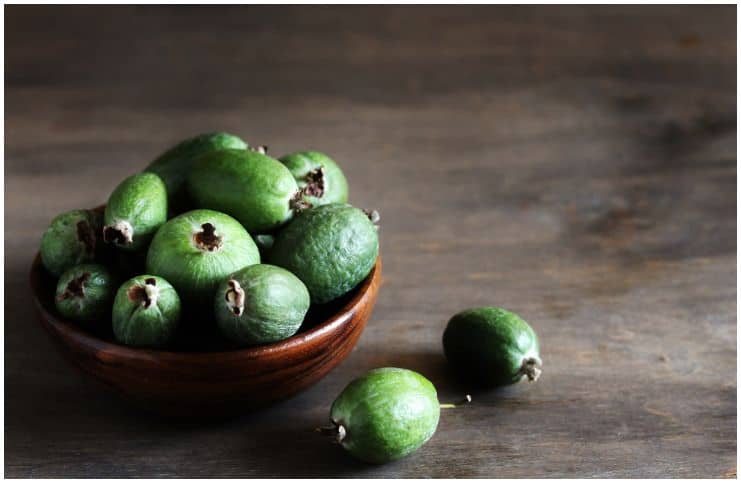Feijoa (Acca sellowiana) – Side Effects, Nutrition Facts, Health Benefits:
The Feijoa (botanical name – acca sellowiana), also known as pineapple guava or guavasteen, is an egg-shaped fruit with a thin lime-green skin.
This plant is native to extreme southern Brazil, northern Argentina, western Paraguay, and Uruguay, where it is commonly found in the mountains, but is now commercially grown in Argentina, New Zealand, Brazil, and Bolivia.
The plant is an evergreen, perennial shrub or small tree with a height of 1-7 meters, and is grown as an ornamental or fruiting tree.
The evergreen tree produces an attractive burst of red flowers in the spring months. Leaves are colored green on the upper surface and silvery gray on the underside.
The fruits are usually eaten raw and measure about 1/5 to 2.5 inches in length, two inches in diameter, and weigh about 50 g. The white-yellow flesh of the feijoa is lovely and sweet and has small seeds.
Nutritional Facts
The fruit has good levels of vitamin C and dietary fiber, small proportions of B-complex vitamins such as niacin, pantothenic acid, vitamin-B6 (pyridoxine) and vitamin E and K. 100 grams of raw fruit feijoa provides 55 calories and is 13 percent carbohydrates, 8 percent sugars, 1 percent each of fat and protein, phosphorous (10 mg), calcium (4 mg), potassium (166 mg), magnesium (8 mg), copper, sodium (5 mg), iron (0.05 mg) and manganese.
The fruit is also bad cholesterol (LDL) free.
How to tell when a pineapple guava fruit is ripe?
When buying this fruit, look for the fruits that feel firm (Tip – the tree drops the fruit when it’s ripe).
Once you’ve opened a pineapple guava, you can see it’s ripe when the jelly-like center is clear; the flesh nearer the skin remains more opaque.
The fruit is ripe when it is slightly soft, and the jellied inner section is clear. Unfortunately, this test of ripeness may only be determined once the fruit is opened. The fruit is unripe when the jelly is white and is spoiled when the jelly is brown.
Health benefits of feijoa (pineapple guava)
Dietary fiber
Found mainly in vegetables, fruits, whole grains, and legumes, dietary fiber is probably best known for its ability to prevent or relieve constipation. The average person only gets about half of the dietary fiber needed daily. Women under 50 should try to get 25 grams a day, and men should shoot for 38 grams.
The recommended dietary fiber intake for children is 14 g/1000 kcal. One guava steen is estimated to provide 1/4 of your daily dietary fiber needs.
Alkaline food
Your pH is partially determined by the mineral density of the foods you eat. When we consume acid-forming foods, our body brings our blood pH back into balance by releasing alkaline-rich minerals such as phosphorus, calcium, and magnesium into our bloodstream.
One of the anti-aging effects of an alkaline diet is that it decreases inflammation and causes an increase in growth hormone production.
High potassium content
This mineral is essential for basic functions of the body, and low levels can take a toll on both your brain and heart. Vomiting, diarrhea, and overactive sweat glands can also cause low potassium syndrome.
According to one survey, only about 5% of the United States population consumes enough vegetables and fruits to receive the right amount of potassium (100g of guavasteen contains 172 mg of potassium).
Iodine
It is an essential trace element that is vital for normal growth and development. Having low amounts of iodine can throw your hormones out of whack because it has a direct effect on your thyroid gland, which in turn regulates many of your hormones.
Iodine deficiency is recognized as the basic cause of goiter (neck swelling).
Vitamin C
Vitamin C is a water-soluble vitamin which is also known as ascorbic acid (but this type is synthetic).
Vitamin C is a powerful antioxidant that protects cells from the damage
caused by free radicals.
Recent studies are finding that vitamin C impacts several important aspects of cardiac health, ranging from blood pressure to endothelial health.
Moreover, vitamin C is an important factor required for the production of collagen, a protein present in connective tissues of the body (ligaments, skin, tendons, muscles). In addition, Vitamin C helps the body absorb and store iron.
100mg of pineapple guava contains 50mg of vitamin C – 40% of the recommended daily intake.
Side Effects of Feijoa
The consumption of this fruit has no known adverse effects on human health. Pregnant mothers and infants can safely eat pineapple guava.
Tip
Once ripe, this fruit should be stored in the refrigerator. If not refrigerated, ripe feijoas only retain their best flavor for two or three days. If the feijoas are not quite ripe, they may be kept in a fruit bowl for a few days.
READ THIS NEXT:
Quercetin Side Effects: Stomach
References http://www.ncbi.nlm.nih.gov/pubmed/19335713 https://ods.od.nih.gov/factsheets/VitaminC-HealthProfessional/
